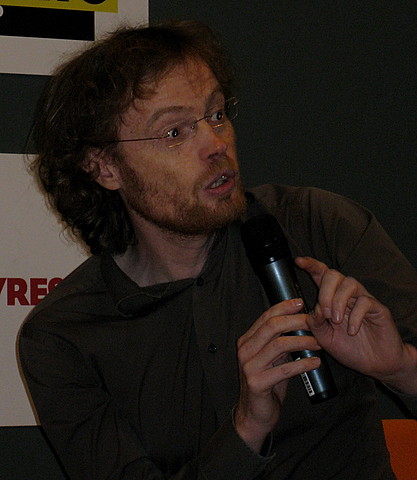Revues.org and the Public Knowledge Project: Propositions to Collaborate (remote session): The Session Blog
Presenter: Marin Dacos
July 9, 2009 at 10:00 a.m. SFU Harbour Centre. Rm. 7000*
*Important Note: As this was a remote session, the presenter’s voice was inaudible most of the time due to technical difficulties and constant breaks in the live audio streaming. Therefore, it was difficult to capture parts of the presentation.
 Marian Dacos (Source)
Marian Dacos (Source)
Background
Session Overview
Mr. Martin Dacos initiated the session by providing a background summary on Revues.org. He indicated there are currently 187 members, with 42000 online humanities and social sciences full-text, open-access documents (Session Abstract). He mentioned that approximately ten years ago, systems were centralized and focused on sciences. And since the beginning of Revues.org, only PDF documents were processed for publishing by converting to extensible markup language (XML). Later, Lodel (electronic publishing software) was developed as a central management system (CMS) where the web service could convert word documents to XML. This is around the time when the Public Knowledge Project (PKP) started up and its focus was to decentralize and provide a more international access point for the publishing of journals and management of conferences through the Open Journal System (OJS). During this time, the two projects, Lodel and PKP, started to converge with two distinct parts and four kinds of services.
(1) The Project Details
The first part of the project, as Mr. Dacos described it consists of using PKP to develop a manuscript management tool to monitor the workflow through OJS. There is a need to create a new interface for users and make it more human-friendly for interaction in order to allow for the dissemination of documents. This portion of the project also investigates the possibility of connecting Lodel and OJS so both systems can use the system jointly. Next, Mr. Dacos explained the second part of the project which deals with document conversion called OTX – which will convert for example RTF to XML. This parallels PKPs development and there is the possibility of sharing information on this creation.
(2) Services
Revues.org offers various kinds of services to allow for the dissemination and communication of scholarly material and other information such as upcoming events. One of the services presented by Revues is Calenda which is claimed to be the largest French calendar system for the social sciences and humanities. This calender service is important because it disseminates information such as upcoming scientific events to the rest of it’s audience. This communication tool is crucial in bringing members of various online communities together to participate in ‘study days,’ lectures, workshops, seminars, symposiums, and share their papers. Another valuable service offered by Revues.org is Hypotheses which is a platform for research documents. This is a free service which allows researchers, scientists, engineers and other professionals to post their experiences on a particular topic or phenomenon for sharing with a wider audience. One can upload a blog, field notes, newsletters, diary inserts, reviews on certain topics, or even a book for publishing. A third service offered by Revues.org is a monthly newsletter called La Lettre de Revues.org. This newsletter connects the Revues.org community together by showcasing various pieces of information. For instance, new members who have recently joined are profiled and new online documents are highlighted for it’s subscribers to read.
The remainder of Mr. Marin Dacos’ talk focused on Lemon8 and OTX which was difficult to interpret due to technical issues.
Questions from the audience asked at Mr. Dacos’ session:
It was difficult to get an audio connection with Mr. Dacos due to technical difficulties, therefore questions were not asked.
Related Links
- Lodel – electronic publishing software system
- The Centre of Open Electronic Publishing
- The National Centre for Scientific Research
- “The CNRS reinforces its policy of access to digital documents in the human and social sciences” (Article)
- Lift France 09 – Conference attended in France
References
Dacos, M. (2009). Revues.org and the public knowledge project: propositions to collaborate. PKP Scholarly Publishing Conference 2009. Retrieved 2009-07-09, from http://pkp.sfu.ca/ocs/pkp/index.php/pkp2009/pkp2009/paper/view/208